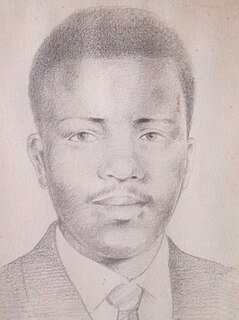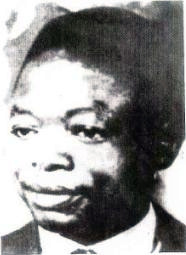Related Research Articles

Cameroon, officially the Republic of Cameroon, is a country in Central Africa. It is bordered by Nigeria to the west and north; Chad to the northeast; the Central African Republic to the east; and Equatorial Guinea, Gabon and the Republic of the Congo to the south. Cameroon's coastline lies on the Bight of Biafra, part of the Gulf of Guinea and the Atlantic Ocean. Although Cameroon is not an ECOWAS member state, it is geographically and historically in West Africa; the Southern Cameroons, which now form her Nord-Ouest and Sud-Ouest Regions, have particularly strong links to West African history. The country is sometimes identified as West African and other times as Central African due to its strategic position at the crossroads between West and Central Africa. Cameroon is home to over 250 native languages spoken by nearly 25 million people.

Paul Biya is a Cameroonian politician serving as the president of Cameroon since 6 November 1982.

Ahmadou Babatoura Ahidjo was a Cameroonian politician who was the first President of Cameroon, holding the office from 1960 until 1982. Ahidjo played a major role in Cameroon's independence from France as well as reuniting the French and English-speaking parts of the country. During Ahidjo's time in office, he established a centralized political system. Ahidjo established a single-party state under the Cameroon National Union (CNU) in 1966. In 1972, Ahidjo abolished the federation in favor of a unitary state. Ahidjo resigned from the presidency in 1982, and Paul Biya assumed the presidency. This was an action which was surprising to Cameroonians. Accused of being behind a coup plot against Biya in 1984, Ahidjo was sentenced to death in absentia, but he died of natural causes in 1989.

Ni John Fru Ndi is a Cameroonian politician. He founded the Social Democratic Front (SDF), the main opposition party in Cameroon, in 1990. He failed to get elected as a senator in 2013.
Alexandre Biyidi Awala, known as Mongo Beti or Eza Boto, was a Cameroonian writer.

Cameroon has a rich and diverse culture made up of a mix of about 250 indigenous populations and just as many languages and customs. The country is nicknamed "Little Africa" as geographically, Cameroon consists of coastline, mountains, grass plains, forest, rainforest and desert, all of the geographical regions in Africa in one country. This also contributes to its cultural diversity as ways of life and traditional food dishes and traditions vary from geographical region to geographical region.

Félix-Roland Moumié was an anti-colonialist Cameroonian leader, assassinated in Geneva on 3 November 1960 by an agent of the SDECE with thallium, following official independence from France earlier that year. Félix-Roland Moumié succeeded Ruben Um Nyobé, who was killed in September 1958, as leader of the Union des Populations du Cameroun.

Ruben Um Nyobè was an anti-colonialist Cameroonian leader, slain by the French army on 13 September 1958, near his natal village of Boumnyebel, in the department of Nyong-et-Kellé in the maquis Bassa. He created on 10 April 1948 the Cameroon's People Union (UPC), which used armed struggle to obtain independence from French colonial rule. After his death, he was replaced by Félix-Roland Moumié, who was assassinated by an agent of the SDECE with thallium in Geneva in 1960. Until the 1990s, any mention of Ruben Um Nyobè was prohibited in Cameroon.

Laurent Esso is a Cameroonian politician who has held a succession of key posts under President Paul Biya since 1988. He served in the government of Cameroon as Minister of Justice from 1996 to 2000, Minister of Public Health from 2000 to 2001, Minister of Defense from 2001 to 2004, and Minister of Foreign Affairs from 2004 to 2006. Subsequently, Esso was Secretary-General of the Presidency, with the rank of Minister of State, from September 2006 to December 2011. He has again served as Minister of Justice since December 2011.

Andre-Marie Mbida was a Cameroonian statesman, a nationalist, the first Cameroonian to be elected Member of Parliament at the French National Assembly, a Prime Minister of Cameroon, the second African-born Prime Minister in Sub-Saharan Africa, the first Head of State of French-speaking autonomous Cameroon from 12 May to 16 February 1958, and the first political prisoner of independent Cameroon from 29 June 1962 to 29 June 1965.

Petit-Pays is a Cameroonian musician.
Francis Bebey was a Cameroonian writer and composer.

Ambasse bey or ambas-i-bay is a style of folk music and dance from Cameroon. The music is based on commonly available instruments, especially guitar, with percussion provided by sticks and bottles. The music is faster-paced than assiko.

Sports in Cameroon is practiced widely by the population and advocated by the national government. Cameroonians take pride in victories at international competitions, making sport an important source of national unity. Traditional sports in Cameroon include canoe racing, swimming, tug of war, and wrestling. Wrestling has featured in the initiation rites and other ceremonies of ethnic groups such as the Bakweri and the Duala. However, in modern times, sports such as basketball, boxing, cycling, handball, netball, caber toss, and table tennis have become popular. The 40 km Mount Cameroon Race of Hope draws several hundred runners each year. Tourists hike, rock climb, and mountaineer, especially up Mount Cameroon. Yaoundé, Tiko and Kribi have golf courses. Rugby union is also played, with about 15 clubs and 3000 players nationally.

Dance in Cameroon is an integral part of the tradition, religion, and socialising of the country's people. Cameroon has more than 200 traditional dances, each associated with a different event or situation. Colonial authorities and Christian missionaries discouraged native dances as threats to security and pagan holdovers. However, after Cameroon's independence, the government recognised traditional dance as part of the nation's culture and made moves to preserve it.
The Unity Day is a holiday in Cameroon celebrated on 20 May. On the 20th of May 1972, in a national referendum Cameroonians voted for a unitary state as opposed to the existing federal state. The United Nations Trust Territory known as French Cameroun achieved independence from France on 1 January 1960, and British Southern Cameroons changed status from a Trusteeship under British administration to a federated state within Cameroon on 1 October 1961. The government chose 20 May as Cameroon's National Day to commemorate President Ahmadou Ahidjo's abolishment of the federal system of government in favor of a unitary country in 1972.
Peter Wuteh Vakunta is an author, literary theorist, poet, and professor, noted for his work in and on hybrid languages, including Camfranglais, Cameroonian Creole, linguistic indigenization, and multilingual educational systems. He is originally from Bamunka-Ndop, in the Northwest Region of the Republic of Cameroon, and currently teaches French language and literature and serves as Chair of the Department of Modern Languages at the University of Indianapolis.
Cameroonian National Paralympic Committee is the primary body in Cameroon for the promotion of sports for people with disabilities. It has four member organizations: Cameroonian Sports Federation for the Visually Impaired (FECASDEV), Cameroonian Sports Federation for the Physically Disabled (FECASDEP), Cameroonian Federation of Sports the Intellectually Disabled (FECASDI) and the Cameroonian Sports Federation for the Deaf (FECASSO). The President of the Cameroonian Paralympic Committee is Jean Jacques Ndoudoumou. The organization has four vice presidents, who all serve as the presidents of CNPC's member organizations.
The Anglophone Problem, as it is commonly referred to in Cameroon, is a socio-political issue rooted in Cameroon's colonial legacies from the Germans, British, and the French.

Hervé Gabriel Ngamago Youmbi, born in Bangui on March 25, 1973, is a Cameroonian artist who lives and works in Douala. He is a founding member of the Cercle Kapsiki, a collective of five Cameroonian artists, founded in 1998.
References
- Mbaku, John Mukum (2005). Culture and Customs of Cameroon. Westport, Connecticut: Greenwood Press.
| | This article about a Cameroonian writer or poet is a stub. You can help Wikipedia by expanding it. |
| | This article about an African poet is a stub. You can help Wikipedia by expanding it. |